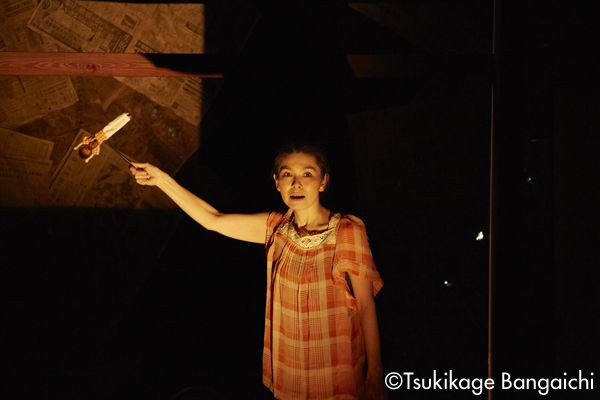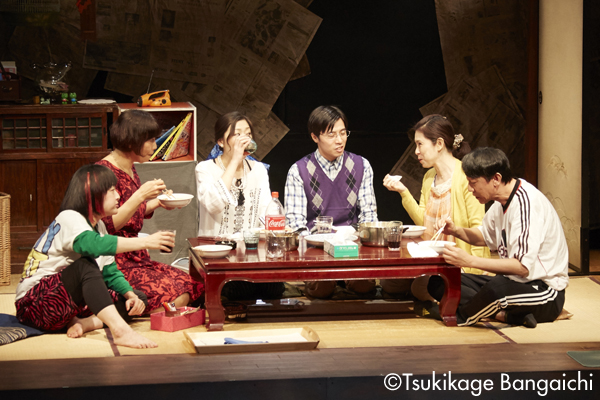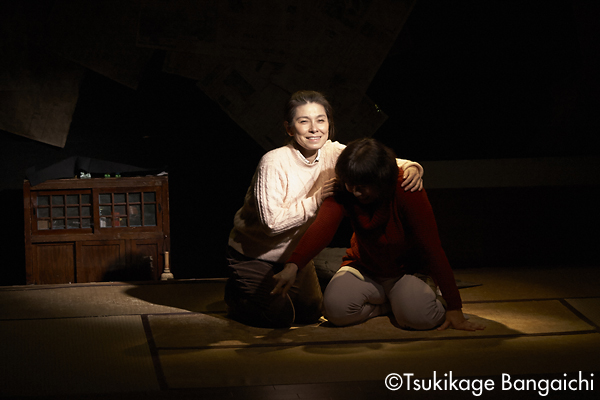


Tsukikage-Bangaichi
Dodome Yuki
(Dec. 3 – 12, 2016 at Shimokitazawa The Suzunari)
Director: Hana Kino
Data
:
Premiere: 2016
Cast: 6 (4 women, 2 men)
Dodome Yuki (Muddy-purple Snow)

(c)西村 淳
Born in Kanagawa Prefecture, Japan in 1975, Mitsunori Fukuhara is a playwright and director. He launched the theater group Pichichi5 (quintet) (2002), the theater unit “Nippon no Kasen” (2006) where the performers operate the music and lighting themselves, and the company Bed & Makings that he co-leads with the actor Kouichiro Tomioka, which does performances outdoors and in unique places like warehouses, and while being active in these groups simultaneously he has continued to be involved in a wide range of activities. Fukuhara has won a reputation for his skill in creating worlds around characters that are simply normal people steeped in images of everyday life and develop their stories toward dramatic endings with universal scale and stages them with small numbers of actors playing multiple roles. He also does productions casting popular actors and writes many scripts for outside companies like the actress Shoko Takada’s theater unit Tsukikage Bangaichi. He was nominated as a finalist for the Kishida Drama Award for his plays Sono Yoake, Uso (2009) starring the actress Aoi Miyazaki and the play Tsunzagi Kouro, Sareru ga mama (2014) that he wrote for Tsukikage Bangaichi. And he also has won a reputation for putting new interpretations on existing works, like his successful 2016 adaptation for the stage of the popular manga Orebushi starring Shota Yasuda of the popular idol group Kan-Johnny∞ (eight). In the field of movies, Fukuhara has written numerous screenplays for films such as the television drama series Virtual Detective Tabibito Higarashi starring for Tori Matsuzaka. In 2015, he debuted as a film director with Ai wo Katareba Hentai desuka
Pichichi5
https://www.ne.jp/asahi/de/do/pichi.html



Tsukikage-Bangaichi
Dodome Yuki
(Dec. 3 – 12, 2016 at Shimokitazawa The Suzunari)
Director: Hana Kino
Data
:
Premiere: 2016
Cast: 6 (4 women, 2 men)
Four sisters, Tsuruko, Sachiko, Yukiko and Taeko (in order from the eldest), live in a regional city where the municipal symbol is a 120-meter high Great Buddha statue. Tsuruko and Yukiko have become independent enough to leave home, and now left living in the old single-story house with its view of the Great Buddha that was their family home is Sachiko and her husband Teinosuke and the youngest of the four sisters Taeko, who is decidedly cynical in nature. Although they are poor, they seem to be living peaceful lives.
The season is spring. Yukiko has brought a man named Takanashi that she has met through a marriage broker to the family home. At this dinner that has brought the four sisters together for the first time in some while, Taeko lets out the family secret that Yukiko’s former boyfriend uploaded nude photos of her on the internet.
“I don’t care about things like that. Let’s get married,” says Takanashi, but as usual, Yukiko remains unable to communicate her feelings honestly to others. A few days later, Takanashi comes to the family home to try to convince Yukiko to marry him.
The season has changed to summer. After revealing the fact that her husband’s construction company has been guilty of sub-standard construction practices due to her strong sense of justice, Tsuruko has been divorced. In an unstable emotional state and with nowhere else to go, she has now returned to stay in the family home. Yukiko, in a lie that she and Takanashi are now married, has also begun living at the family home on the excuse that they need to save money in order to live together on the meager salary he earns as a part-timer. Because they are family, Sachiko and Teinosuke have accepted the new residents.
There has been a series of incidents of windows being broken at the outlet mall where Teinosuke works as a security guard, but Sachiko and Teinosuke are rather pleased with the development because it means more overtime pay for him. Then a window breaking occurs at their own home, and from the threat message left behind, it becomes evident that the perpetrators are members of the local merchants committee who had protested the building of the outlet mall that is now taking business away from them. Again moved by her strong concern for justice, Tsuruko has begun corresponding with the perpetrators and is admitting that there are problems with the outlet mall and that the people like her family who didn’t oppose it in the beginning should have been more diligent in studying the issue.
Sachiko argues with Tsuruko, however, saying that she wishes Tsuruko would worry less about her simplistic sense of justice and begin living for herself more confidently. Just then, a rock comes crashing through the ceiling. This causes Tsuruko to dash outside, where she is nearly hit by a truck. However, due to the quick reaction with a magical force exerted by Sachiko, who has followed her out, Tsuruko’s life is saved.
The season changes to autumn. We learn that twelve years earlier when she was in middle school, Taeko had pushed a classmate into the river and the girl had died of drowning. Taeko had atoned for her sin, but now it has come to light that delayed payment must be made of compensation owed to the victim’s family. This announcement causes Teinosuke and Yukiko to lose their jobs. The blow to the family’s finances, which are now stretched to the point that they will have to sell their house, forces all of them to take part-time employment working night shifts as surveillance guards for the prevention of illegal dumping.
Sachiko confides with Takanashi alone that she has the power to move things simply by pointing her finger at them, which is known as “Sachiko’s power.” But, this power only works when everyone present at the time are hoping for the same thing to happen. As she is saying this, Yukiko suddenly falls into the river. As she starts to drown, Yukiko is thinking that in order to decide what path she will take going forward, she simply has to decide which direction to face. Then, as if suddenly experiencing an awakening, she rises and crawls out of the water by herself.
Meanwhile, as she was watching Yukiko being swept away by the river’s current, Taeko began to remember the drowning incident twelve years earlier. Then she begins speaking, saying that actually she had not intentionally pushed her classmate into the river, in fact it had been an accident. However, thinking that no one would believer if she denied intentionally pushing the girl, Taeko says she had decided that it would be simpler to just admit to the crime, rather than trying to make excuses.
It is winter now. The day has come when the family must move out of their house. As they are all working to move their belongings, they suddenly hear a huge crashing sound. Tsuruko had snuck into the construction site where she had suspected sub-standard construction practices and climbed up into a huge pile driver, and when she tried to operate it the whole machine came crashing to the ground.
Seeing Tsuruko lying on the ground seemingly lifeless, Takanashi urges Sachiko, saying, “Now is the time to use your “Sachiko Power.” Sachiko is forced to decide if she really wants to save Tsuruko. Still in a state of indecision, Sachiko suddenly gathers her courage and uses the Sachiko Power to bring Tsuruko back to life. Just then, a single flake of snow falls.
Several years have passed. The four sisters are living their lives as best they can. Now 58, Sachiko is suddenly stabbed by a knife-man on the street. Tsuruko, who was walking her, copies Sachiko by pointing to her fallen sister and saying aloud to the passers-by around her, “Ready, everybody wish the same thing!” And, what happens …?
Related Tags